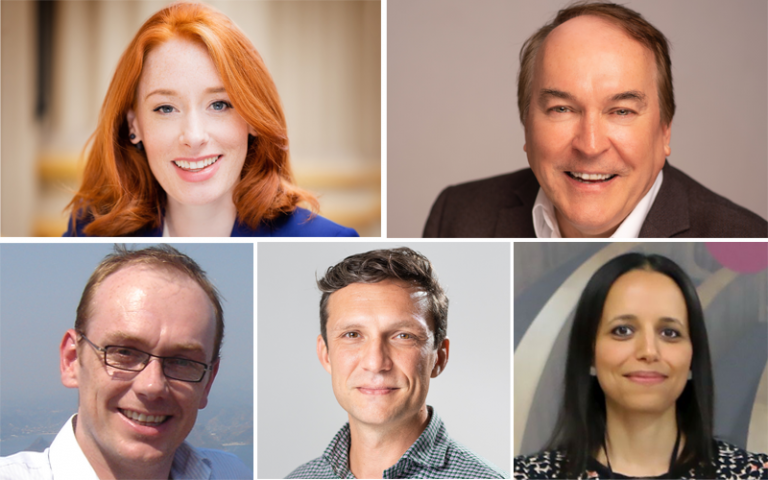UCL academics named as Royal Academy of Engineering Fellows
21 September 2022
Five UCL academics have been elected as Fellows of the Royal Academy of Engineering in recognition of their exceptional contributions to engineering and technology.

The Fellowship represents the UK’s best engineering researchers, innovators, entrepreneurs, business and industry leaders. Each Fellow has made significant contributions to the profession, by pioneering new innovations, leading progress in business or academia, providing high level advice to government or promoting wider understanding of engineering and technology.
Those awarded from UCL in 2022 are:
Professor Daniel Alexander (UCL Computer Science), Director of the UCL Centre for Medical Image Computing . Professor Alexander’s research is focused on medical imaging and analysis. He has developed new magnetic resonance imaging (MRI) techniques that can help clinicians understand the processes underlying neurodegenerative diseases such as Alzheimer’s disease and dementia or identify which cancer patients will respond best to which treatments.
Professor Peter Coveney (UCL Chemistry), Associate Director of the UCL Advanced Research Computing Centre (ARC). Professor Coveney’s research covers a wide range of science and engineering fields, including physics, chemistry, chemical engineering, materials, computer science, high performance computing and biomedicine, much of it harnessing the power of supercomputing to conduct original research at unprecedented space and time scales. He has run multiple initiatives and multi-partner interdisciplinary grants in the UK, Europe and the US.
Professor Suzanne Farid (UCL Biochemical Engineering), Co-Director of the UCL Future Targeted Healthcare Manufacturing Hub. Professor Farid leads internationally in decisional tools research to facilitate cost-effective bioprocess design, capacity planning, research and development (R&D) portfolio management and data mining for biopharmaceuticals. Her pioneering research has helped biotech companies make smarter decisions about process development and manufacturing, enabling therapeutics to be brought to market faster and at lower cost, facilitating wider access to these medicines.
Professor Hannah Fry (UCL Centre for Advanced Spatial Analysis). Professor Fry uses mathematical models to study patterns in human behaviour, particularly in an urban setting. Her research looks at a wide range of social problems and questions, from shopping and transport to urban crime, riots and terrorism, and she has applied her work to advising organisations including governments, police forces, health analysts and supermarkets. Professor Fry is also a well-known presenter, engaging the UK public with mathematics in documentaries, radio shows, podcasts and talks.
Professor Danail Stoyanov (UCl Computer Science). Professor Stoyanov’s research has developed technology to automatically understand surgical images and video. By using artificial intelligence, specifically computer vision, the cameras used during keyhole surgery can measure the position of surgical instruments, the shape of organs and activity at the surgical site. This information helps surgeons to better understand their practice, navigate the anatomy and make decisions during operations. In the future it will become an important source of information for making advanced robotic surgical instruments smarter and safer.
This year’s new Fellows reflect the Academy’s ongoing Fellowship Fit for the Future initiative announced in July 2020, to drive more nominations of outstanding engineers from underrepresented groups ahead of its 50th anniversary in 2026. Through this initiative the Academy seeks to increase representation from women, LGBTQ+ engineers, those with disabilities, from minority ethnic backgrounds, non-traditional education pathways and emerging industries and those who have achieved excellence at an earlier career stage.
Professor Nigel Titchener-Hooker, Dean of the UCL Faculty of Engineering, said: “Royal Academy of Engineering Fellows give their time and expertise to advance excellence in engineering for the benefit of society. It is a reflection of their extremely hard work and dedication to the field, and I offer my congratulations to this year’s cohort.”
Sir Jim McDonald, President of the Royal Academy of Engineering, said: “I am delighted to welcome such an array of enormously talented people to the Fellowship of the Royal Academy of Engineering. From industry and enterprise to education and government – both national and international – these are some of our most pioneering and distinguished engineers and technologists.
“In an uncertain world, one thing is certain – engineering skills, vision and leadership will play a crucial part in addressing the escalating domestic and global challenges that we face today. The combined connectivity, professionalism, experience and wisdom of the new Fellows who join us today will greatly enrich the expertise and support we can provide to the government and to society in general.”
Links
- Professor Daniel Alexander’s academic profile
- Professor Peter Coveney’s academic profile
- Professor Danail Stoyanov’s academic profile
- Professor Hannah Fry’s academic profile
- Professor Suzanne Farid’s academic profile
- UCL Computer Science
- UCL Chemistry
- The Bartlett Centre for Advanced Spatial Analysis, UCL
- UCL Engineering
- UCL Mathematical & Physical Sciences
- The Bartlett, UCL Faculty of the Built Environment
Image
- Clockwise from top left: Professors Hannah Fry, Peter Coveney, Suzanne Farid, Danail Stoyanov, Daniel Alexander. Credit: Academics and UCL
Source
Media contact
Kate Corry
Tel: +44 (0)20 3108 6995
Email: k.corry [at] ucl.ac.uk
 Close
Close

